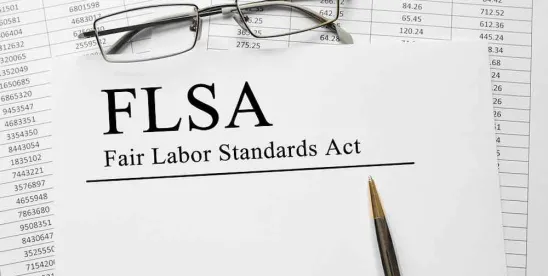On July 1, 2025, the U.S. Court of Appeals for the Ninth Circuit vacated a district court’s preliminary certification of a Fair Labor Standards Act (FLSA) collective action, holding that district courts in the Ninth Circuit must assess whether each prospective opt-in plaintiff can satisfy personal jurisdiction requirements before being allowed to join an FLSA collective action. The decision has significant implications for FLSA collective action litigation against employers.
Quick Hits
- The Ninth Circuit held that when the basis for personal jurisdiction in a collective action is specific personal jurisdiction, a district court must assess personal jurisdiction on a claim-by-claim basis as to each opt-in plaintiff, potentially limiting the scope of collective actions filed against defendants in courts outside of their home states.
- In doing so, the Ninth Circuit joined the Third, Sixth, Seventh, and Eighth Circuits and rejected the First Circuit’s approach, which requires only that a court have specific personal jurisdiction over the named plaintiff’s claim.
- The court upheld the district court’s decision to notify prospective opt-in plaintiffs who are potentially subject to arbitration agreements before determining the arbitrability of the claims.
In Harrington v. Cracker Barrel Old Country Store, Inc., a Ninth Circuit panel vacated a district court’s preliminary certification of a nationwide FLSA collective action filed against a Tennessee-based restaurant chain. It ruled that the district court erred by finding that a single plaintiff with claims against Cracker Barrel based on its business in Arizona was sufficient to establish personal jurisdiction over the restaurant chain for all claims in the collective action when the restaurant chain was not otherwise subject to general personal jurisdiction in Arizona.
The Ninth Circuit then remanded the case to the district court to reassess preliminary certification in light of its holding that specific personal jurisdiction must be assessed on a claim-by-claim basis before authorizing the sending of court-approved written notice to prospective opt-in plaintiffs.
The Ninth Circuit also held that the district court was not required to determine the arbitrability of prospective opt-in plaintiffs before authorizing notice, since there were issues of fact regarding the arbitration agreements that needed to be resolved.
Background
A group of current and former Cracker Barrel employees who were not subject to arbitration agreements filed suit in the U.S. District Court for the District of Arizona, alleging the company had violated the FLSA in how it applied tip credits to the wages of tipped workers. The plaintiffs sought to preliminarily certify a collective action and send notice to prospective opt-in plaintiffs across the United States.
Cracker Barrel argued that the notice should not be sent to employees subject to its arbitration agreements or to employees outside of Arizona—where Cracker Barrel was not subject to general personal jurisdiction—to the extent that the court did not have specific personal jurisdiction over their claims.
The district court authorized nationwide notice and reserved judgment on the issue of the arbitration agreements’ applicability until later in the proceedings. It further concluded that nationwide notice of the collective action was permissible, finding that because specific personal jurisdiction existed for the Arizona-based named plaintiff’s claims, Cracker Barrel was subject to personal jurisdiction in Arizona for all claims brought by similarly situated plaintiffs in the collective action—including claims brought by nonresident opt-in plaintiffs. The Ninth Circuit granted an immediate appeal.
Personal Jurisdiction and Nationwide Notice in a Collective Action
The Ninth Circuit disagreed with the district court’s handling of the issue of personal jurisdiction. Its ruling turned on the Supreme Court of the United States’ 2017 decision in Bristol-Myers Squibb Co. v. Superior Court of California, in which the Court held that a state court lacked personal jurisdiction in a mass tort case involving hundreds of out-of-state residents.
While acknowledging the circuit split about whether that decision applied in the context of an FLSA collective action, the Ninth Circuit joined the Third, Sixth, Seventh, and Eighth Circuits in holding that it did. The First Circuit’s approach requires only that a court have specific personal jurisdiction over the named plaintiff’s claim.
Relying on Bristol-Myers, the Ninth Circuit stated that mass actions and FLSA collective actions are “analogous,” and that, “in a case made up of individual claims by individual parties, it logically follows that personal jurisdiction be analyzed on an individual basis rather than at the level of the suit.”
“Consequently, where the basis for personal jurisdiction in the collective action is specific personal jurisdiction, the district court must assess whether each opt-in plaintiff’s claim bears a sufficient connection to the defendant’s activities in the forum state,” the Ninth Circuit found.
“Because the district court authorized nationwide notice on the mistaken assumption that it would not need to assess specific personal jurisdiction on a claim-by-claim basis, we vacate and remand [the case] for further proceedings consistent with this opinion,” the court stated.
Notice to Employees Potentially Subject to Arbitration Agreements
The Ninth Circuit upheld the district court’s decision to allow the sending of notice to prospective opt-in plaintiffs who might be subject to arbitration agreements. While the Ninth Circuit agreed that it would be an abuse of discretion to authorize notice to employees whose claims were indisputably subject to arbitration, it expressly declined to “adopt any bright-line rule requiring district courts in all cases to make conclusive determinations regarding the arbitrability of prospective opt-in plaintiffs’ claims prior to the dissemination of notice.”
The appellate court thus held that the district court did not abuse its discretion in allowing notice to be sent to employees whose claims were potentially subject to arbitration, since the district court had found “multiple issues of fact” that needed to be resolved to “determine which prospective opt-in plaintiffs might be required to arbitrate their claims.”
Key Takeaways
Cracker Barrel clarifies critical issues in the certification process for collective actions and the application of personal jurisdiction principles. In particular, the Ninth Circuit extended the Supreme Court’s Bristol-Myers holding to FLSA collective actions, requiring courts to assess personal jurisdiction on a claim-by-claim basis, and widened the circuit split on the issue. This decision may significantly limit the scope of collective actions when defendants are haled into courts where they are not subject to general personal jurisdiction.






 />i
/>i

